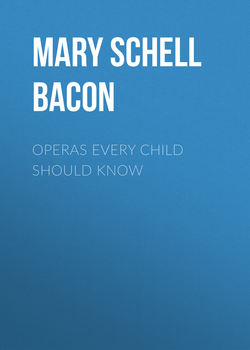Читать книгу Operas Every Child Should Know - Mary Schell Hoke Bacon - Страница 6
BERLIOZ
Оглавление“THE Damnation of Faust” was first produced as an opera, by Raoul Gunsburg, in Monte Carlo, about 1903. Before that time it had been conducted only as a concerted piece. Later it was produced in Paris, Calvé and Alvarez singing the great rôles. That was in the late spring of 1903.
In Europe the opera was produced with the dream scene (the dream-Marguerite) as in the original plan of Berlioz, but in this country this dream-Marguerite was omitted, also the rain in the ride to Hell; otherwise the European and the New York production were much the same. At the Metropolitan Opera House, in New York, there were three hundred people upon the stage in the first act, and every attention was given to scenic detail. This piece is meant for the concert room, and in no sense for the operatic stage, but great care and much money have been spent in trying to realize its scenic demands. As a dramatic production, it cannot compare with the "Faust" of Gounod, but it has certain qualities of a greater sort, which have made impresarios desire to shape it for the stage.
Berlioz was probably one of the least attractive of musicians. As a man, he was entirely detestable. He despised (from jealous rather than critical motives) all music that was not his own; or if he chose to applaud, his applause was certain to be for some obscure person without ability, in order that there might be no unfavourable comparisons drawn between his own work and that which he was praising. Beyond doubt he was the greatest instrumentalist of Europe, but he was bizarre, and none too lucid.
His method of showing his contempt for other great composers like Beethoven, Mozart, and the like, was to conduct their music upon important occasions, without having given himself or any one else a rehearsal. He called Haydn a "pedantic old baby," and refused as long as he lived to hear Elijah (Mendelssohn). In short, he was one of the vastly disagreeable people of the earth, who believe that their own genius excuses everything.
The story of his behaviour at a performance of Cherubini's Ali Baba will serve as an illustration of his bad taste.
Cherubini had become old, and was even more anxious about the fate of his compositions than he had been in his youth, having less confidence in himself as he declined in years, and on the occasion of Ali Baba he was especially overwrought. Berlioz got a seat in the house, and made his disapproval of the performance very marked by his manner. Finally he cried out toward the end of the first act, "Twenty francs for an idea!" During the second act he called, "Forty francs for an idea!" and at the finale he screeched, "Eighty francs for an idea!" When all was over, he rose wearily and said, loud enough to be heard all over the place, "I give it up – I'm not rich enough!" and went out.
There is hardly an anecdote of Berlioz extant that does not deal with his cynicism or displeasing qualities, therefore we may more or less assume that they pretty correctly reflect the man. One of the stories which well illustrates his love of "showing up" his fellows, concerns his Fuite en Egypte. When it was produced he had put upon the programme as the composer one Pierre Ducré "of the seventeenth century." The critics, one and all, wrote of the old and worthless score that Berlioz had unearthed and foisted upon the suffering public. Some of them wrote voluminously and knowingly of the life of Pierre Ducré, and hinted at other productions of his, which they said demonstrated his puerility. Then when he had roused all the discussion he pleased, Berlioz came forward and announced that there never had been any such personage as Ducré, and that it was himself who had written Fuite en Egypte. He had made everybody appear as absurd as possible, and there is no sign that he ever did that sort of thing for the pure love of a joke. He was malicious, born so, lived so, and died so. However great his music, he was unworthy of it.
